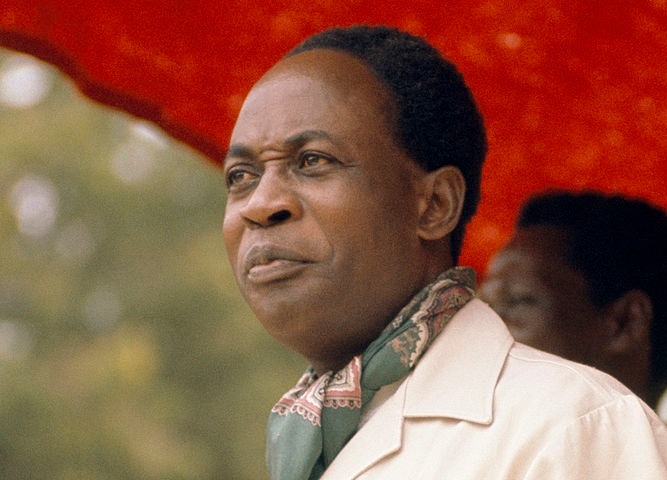Kindness is not the first thing that comes to mind whenever a politicians name is mentioned. It is even harder to believe that presidents who hold the topmost position in politics are kind as many of them have a strong history of greed, corruption and even violence, including murder.
While the political history of African presidents has not been as optimistic as many hoped it to be, there are some who have, in one way or the other, showed kindness that has contributed to the development of many individuals or a whole nation
Here are four African presidents who have demonstrated kindness in different ways.
Kwame Nkrumah  Ghana’s first president, Kwame Nkrumah was a staunch Pan Africanist and anti-colonialist, who after gaining independence for Ghana, worked hard at empowering other African nations to do same.
Ghana’s first president, Kwame Nkrumah was a staunch Pan Africanist and anti-colonialist, who after gaining independence for Ghana, worked hard at empowering other African nations to do same.
Nkrumah and Ahmed Sekou Toure, the first president of the Republic of Guinea became very close allies for they had the same vision for their countries and for Africa.
In the 1960s Nkrumah offered Toure $10 million to help restore the economy of Guinea, which had been in shambles since 1958 when the latter decided that the country must become an independent state without any financial and economic support from the French. He had prepared independence than to an autonomy under France’s fifth republic.
The money went a long way to help Guniea. Even though it created controversies, it is considered one of the greatest act of kindness by African president.
Nelson Mandela Nelson Mandela is one of the most, humble selfless and kind presidents Africa has had. It often hard for many to pair his soft-spoken nature with his passion for justice, freedom and political transparency.
Nelson Mandela is one of the most, humble selfless and kind presidents Africa has had. It often hard for many to pair his soft-spoken nature with his passion for justice, freedom and political transparency.
Mandela was a catalyst for several uproars in South Africa that led to the country’s freedom and the fair treatment of blacks on their own land. His boldness caused many other nationalists to rise up and speak in confidence, which slowly instigated rivalry and tension between white and blacks in South Africa.
In 1963, Mandela, alongside 12 other ‘controversial South African politicians, was arrested and convicted for sabotage after being found in Liliesleafarm Farm in Rivonia, where they had been hiding for two years. At the time, Mandela had been listed as a terrorist by the U.S. government after evading the police and going into hiding since 1961.
Following his capture, Mandela gave his popular ‘I am Ready To Die’ speech, in which stated his readiness to die for a peaceful but free South Africa. He was later sentenced to death after being found guilty. While in prison, he often wrote many letters pleading with the people to remain peaceful but to never neglect the fight for what they believed in. His call for peace and willingness to die for a peaceful country earned him the 1993 Nobel Peace Prize.
Abiy Ahmed Ali He may not the favourite of many Ethiopians but Prime Minister Abiy Ahmed Ali has, since his appointment, made it a necessity to give women a chance in governmental decisions that affect the lives of the everyday Ethiopians and the development and progress of the country.
He may not the favourite of many Ethiopians but Prime Minister Abiy Ahmed Ali has, since his appointment, made it a necessity to give women a chance in governmental decisions that affect the lives of the everyday Ethiopians and the development and progress of the country.
His act of kindness to give women a more than deserving chance and elevation stems from the belief that women are less corrupt than men and can help make progressive plans easier.
Early in October, he appointed women to half of his government’s ministerial posts. The historic appointments included Aisha Mohammed, who is the first woman to become a defence minister and the appointment of Meaza Ashenafi as the country’s first female Chief Justice. Also historic was the appointment of Sahle-Work Zewde as the country’s first female president following the resignation of President Mulatu Teshome.
Muammar Mohammed Abu Minyar Gaddafi  Popularly known as Gadaffi, he is the former Prime Minister of Libya whose named stirs up a lot of controversies and dark memories. The radical leader is remembered for his revolutionary and not so revolutionary ideals. He was captured and killed in 2011 during the battle of Sirte.
Popularly known as Gadaffi, he is the former Prime Minister of Libya whose named stirs up a lot of controversies and dark memories. The radical leader is remembered for his revolutionary and not so revolutionary ideals. He was captured and killed in 2011 during the battle of Sirte.
Despite being remembered for his not-so-colourful actions, Gaddafi was also very particular about a purely independent Africa and attempted to do so starting with Libya.
For one, he put $65 billion into sovereign wealth fund to make investments in Africa, a $100 million investment fund for Niger and relieved Mauritania off a huge percentage of the $200 million dollar debt to Libya, among other things.





























